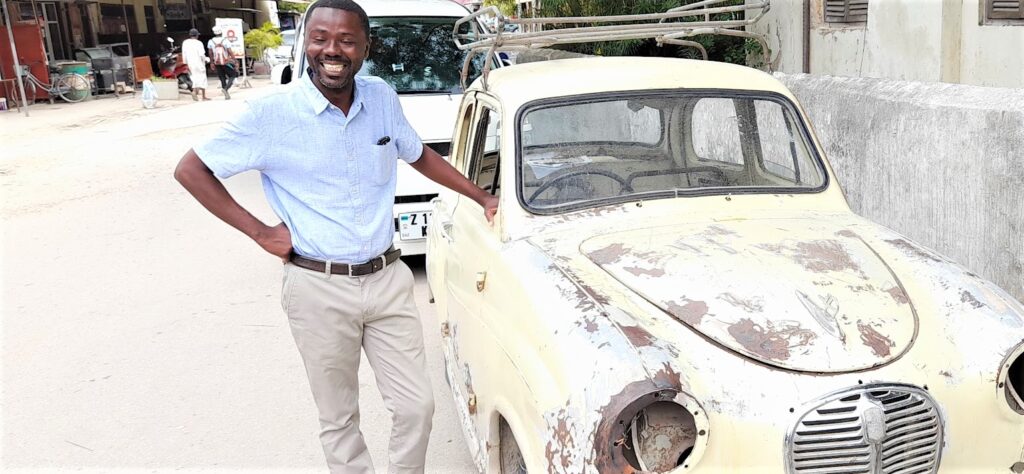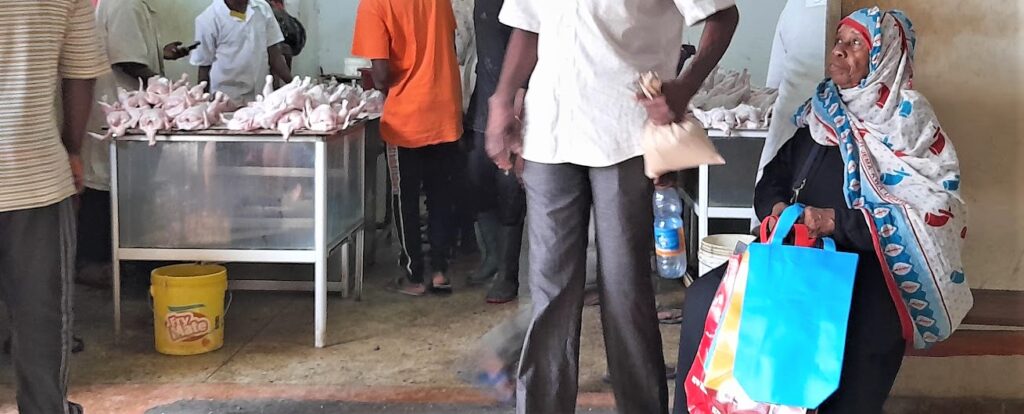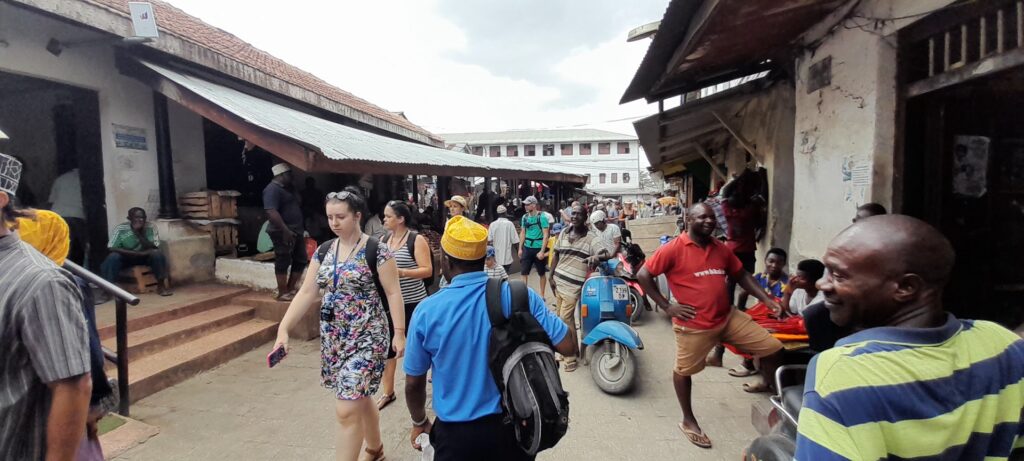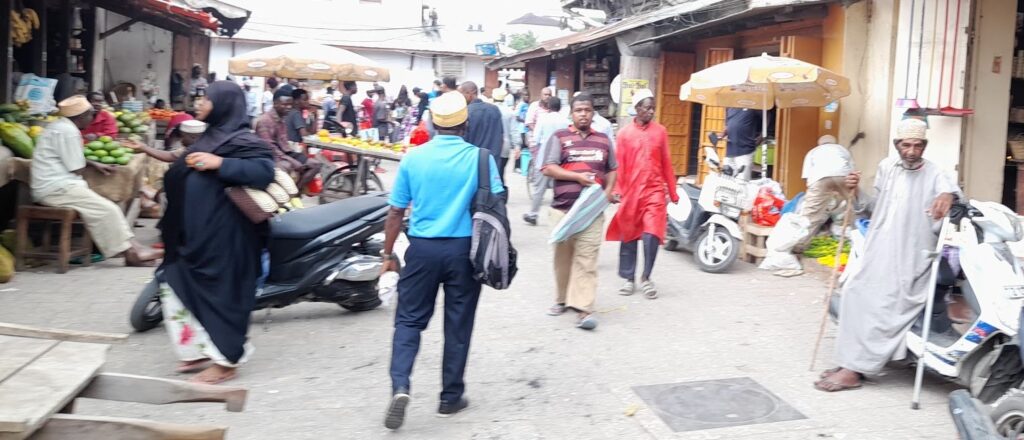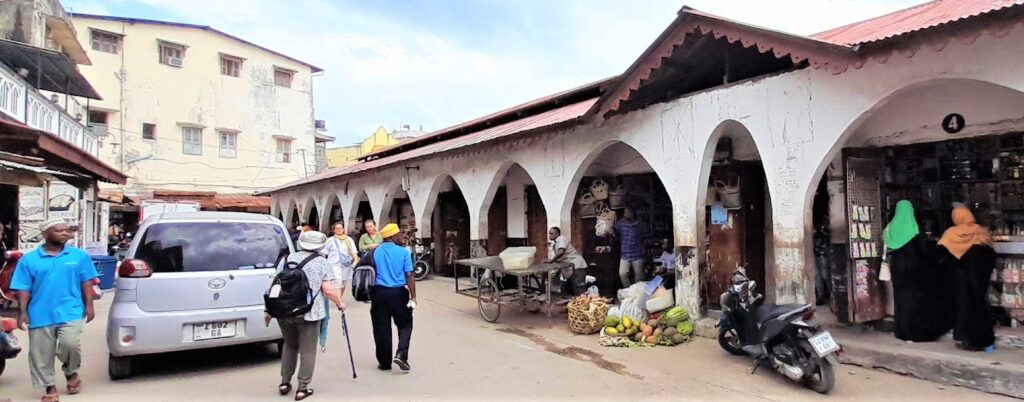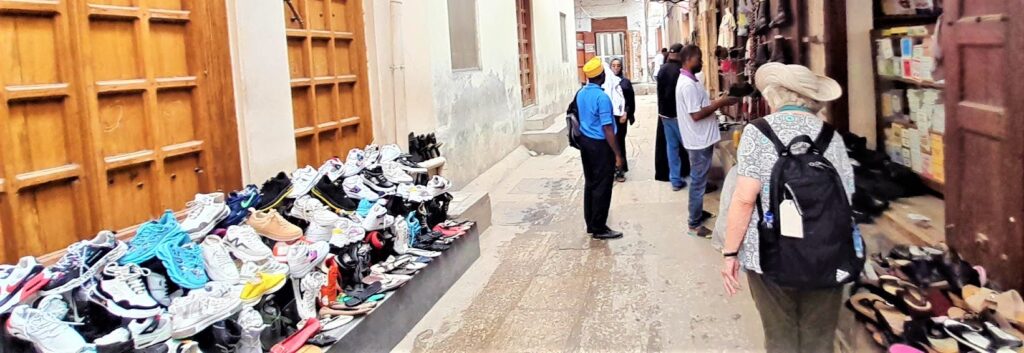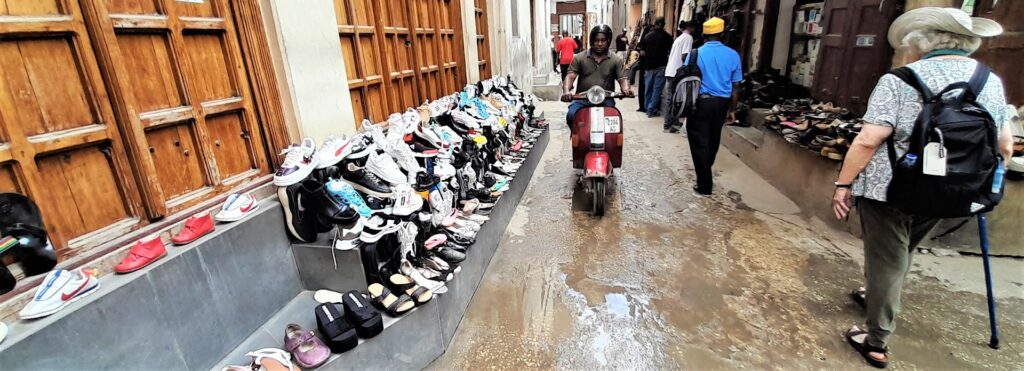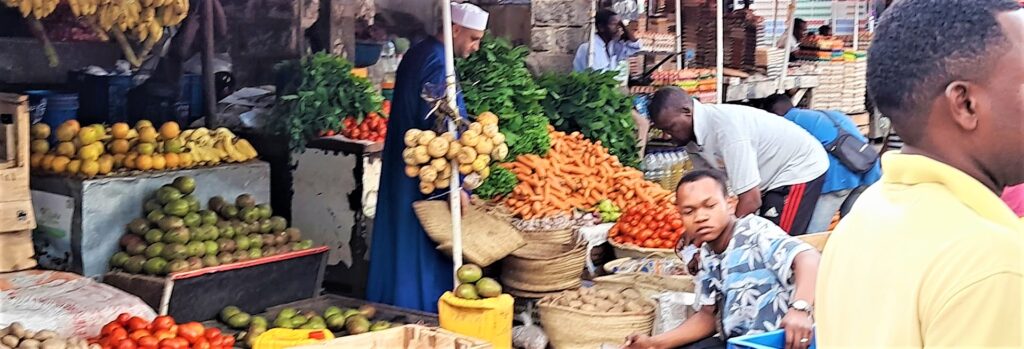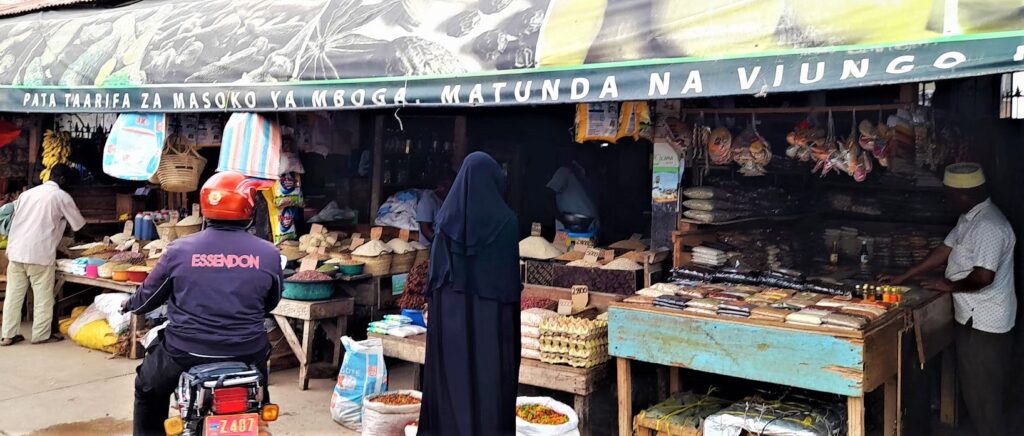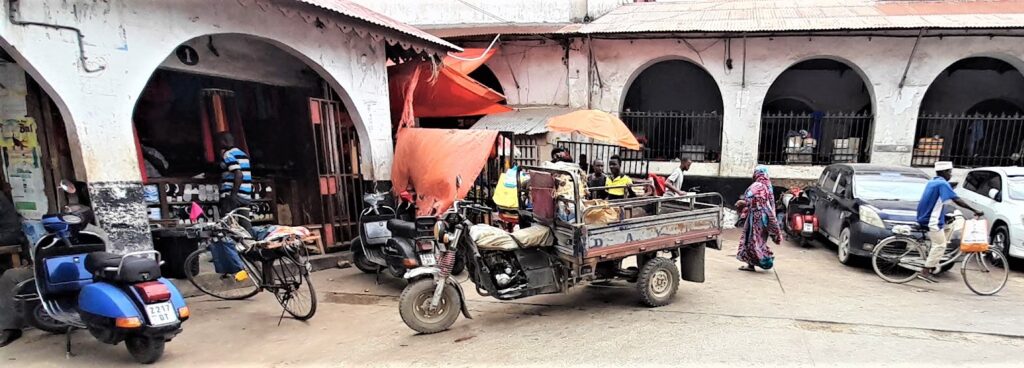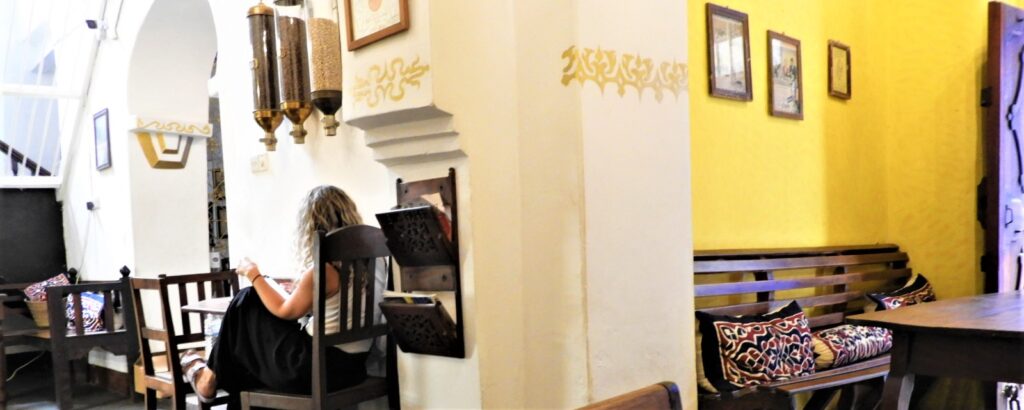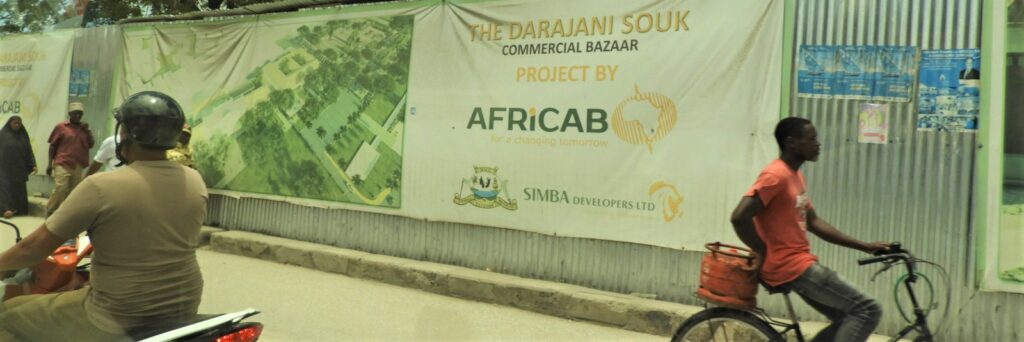» posted on Monday, September 26th, 2022 by Linda Lou Burton
To Market, To Market
Linda Lou Burton posting from Zanzibar Serena Hotel, Stone Town, Zanzibar, Tanzania – 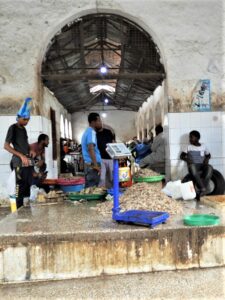 A fat pig is about the only thing I didn’t see in Darajani Market this morning. Zanzibar is 99% Muslim, and since pork isn’t an approved dietary item in the Islamic religion, you wouldn’t expect to see it in local stores, or on restaurant menus. Beef, chicken, and goat are on the approved list, as well as seafood; so in a country right on the ocean’s coastline, it makes sense that the Fish Market was the first spot I caught a whiff of. The “morning catch”? I’d watched the fishing boats from my porch at
A fat pig is about the only thing I didn’t see in Darajani Market this morning. Zanzibar is 99% Muslim, and since pork isn’t an approved dietary item in the Islamic religion, you wouldn’t expect to see it in local stores, or on restaurant menus. Beef, chicken, and goat are on the approved list, as well as seafood; so in a country right on the ocean’s coastline, it makes sense that the Fish Market was the first spot I caught a whiff of. The “morning catch”? I’d watched the fishing boats from my porch at 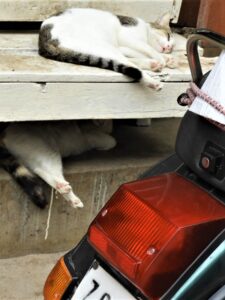 dawn, cruising slowly by, voices likely discussing the catch (good, or bad); is that what I saw in the pile just inside the fishy-smelling building? The market is (understandably) a paradise for cats; as I walked along I spotted cats everywhere; licking their paws, taking a snooze, their little sniffers dreaming sweet, sweet dreams.
dawn, cruising slowly by, voices likely discussing the catch (good, or bad); is that what I saw in the pile just inside the fishy-smelling building? The market is (understandably) a paradise for cats; as I walked along I spotted cats everywhere; licking their paws, taking a snooze, their little sniffers dreaming sweet, sweet dreams.
 I was headed for the Zanzibar Coffee House. Tour Guide Said worked it out with Ali, our driver, to get me as close as possible about the time he and Rick would arrive on the Walking Tour. The “closest” was a 10-minute walk for me (slowly, slowly, pole, pole) through the swirling noise and smells and color where everything was for sale but pig. Spice Island spices, yes. Octopus, changu (a favorite fish), chicken, piles of seafood; bananas, oranges, avocado, pineapple. Shoes. Electronics. What fascinated me most? We’d seen piles of produce and clothing and other tradeable items at markets all the way through Kenya and Tanzania, so crowds and color were not unusual to my eyes. Here though, everything was compressed; tucked into the narrowest of spaces, which seemed to magnify the scene. A dazzling mixture of Arab, Persian, Indian, European and African styles and traditions! Stone Town’s cast of characters is better than a Hollywood movie set. Action! Camera!
I was headed for the Zanzibar Coffee House. Tour Guide Said worked it out with Ali, our driver, to get me as close as possible about the time he and Rick would arrive on the Walking Tour. The “closest” was a 10-minute walk for me (slowly, slowly, pole, pole) through the swirling noise and smells and color where everything was for sale but pig. Spice Island spices, yes. Octopus, changu (a favorite fish), chicken, piles of seafood; bananas, oranges, avocado, pineapple. Shoes. Electronics. What fascinated me most? We’d seen piles of produce and clothing and other tradeable items at markets all the way through Kenya and Tanzania, so crowds and color were not unusual to my eyes. Here though, everything was compressed; tucked into the narrowest of spaces, which seemed to magnify the scene. A dazzling mixture of Arab, Persian, Indian, European and African styles and traditions! Stone Town’s cast of characters is better than a Hollywood movie set. Action! Camera!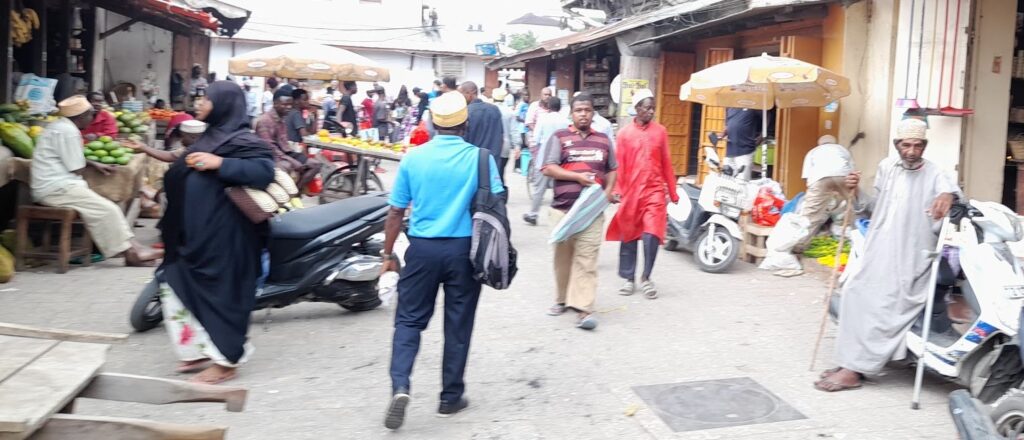
Some things to get a picture of: traditional buildings have a baraza, a long stone bench for resting or socializing along the outside walls; it’s an elevated sidewalk if it rains too much. Most buildings have large verandas (look up) protected by carved wooden balustrades. The 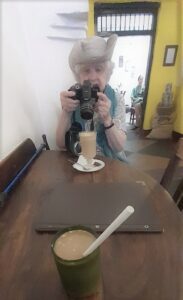 town is a maze of narrow alleys and most streets are too narrow for cars, so it’s crowded with bicycles and motorbikes. Darajani Market, which has been around since 1904, is on the edge of Stone Town, extending to the wider street along the seafront. Another interesting market – actually a giant open-air restaurant
town is a maze of narrow alleys and most streets are too narrow for cars, so it’s crowded with bicycles and motorbikes. Darajani Market, which has been around since 1904, is on the edge of Stone Town, extending to the wider street along the seafront. Another interesting market – actually a giant open-air restaurant 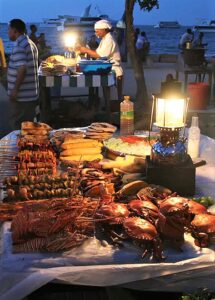 – is in Forodhani Park, right on the waterfront. Every night food stalls set up there to serve every kind of seafood you can imagine; people come in droves (locals and tourists alike); hey, Anthony Bourdain did a feature on it; he had octopus! Did I get my Zanzibarian coffee today? I did indeed, in an authentic Arabic house constructed in 1885 by Sir Tharia Topan, Wazir to Sultan Said Barghash. A wazir is an aide, or minister, by the way. More on sultans coming up.
– is in Forodhani Park, right on the waterfront. Every night food stalls set up there to serve every kind of seafood you can imagine; people come in droves (locals and tourists alike); hey, Anthony Bourdain did a feature on it; he had octopus! Did I get my Zanzibarian coffee today? I did indeed, in an authentic Arabic house constructed in 1885 by Sir Tharia Topan, Wazir to Sultan Said Barghash. A wazir is an aide, or minister, by the way. More on sultans coming up.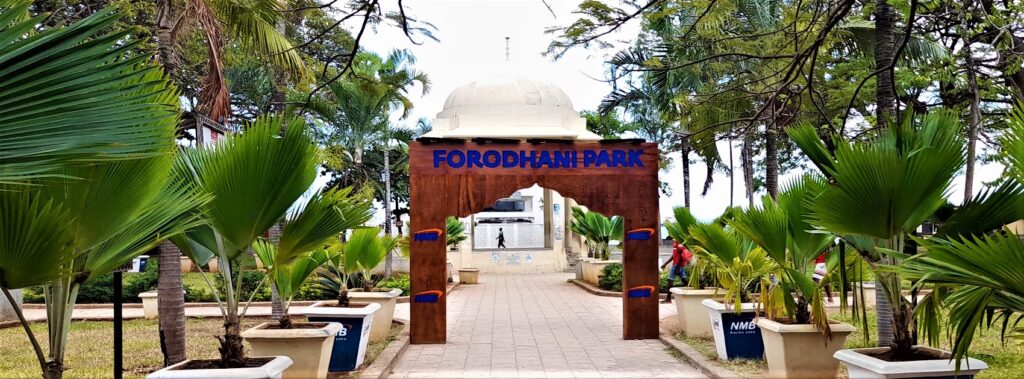
Can you find our guide Said? He’s wearing the gold hat (kufi) and the blue shirt.
“To Market, To Market” is a folk nursery rhyme based upon the traditional rural activity of going to a market where agricultural products would be bought and sold. Typically chanted when bouncing baby on your knee, it came to mind while I was walking “the market” today.
- To market, to market, to buy a fat pig,
- Home again, home again, jiggety-jig.
- To market, to market, to buy a fat hog,
- Home again, home again, jiggety-jog.
- To market, to market to buy a plum cake,
- Home again, home again, market is late.
- To market, to market, to buy a plum bun,
- Home again, home again, market is done.
Zanzibar Serena Hotel https://www.serenahotels.com/zanzibar
Zanzibar Coffee House https://www.utengule.com/zanzibar-coffee-house
Fisherman’s Tours https://fishermantours.com/
Next Post: Sultans and Slavers

